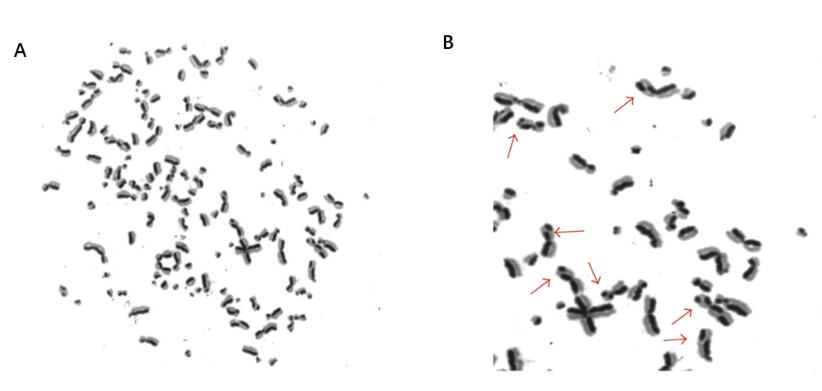SCE (Sister Chromatid Exchange) Analysis
Sister chromatid exchange (SCE) is the exchange event of genetic material between two identical sister chromatids. Sister chromatid exchange analysis is a classic toxicology assay for genotoxicity and for detecting alterations to the biochemistry underlying cellular homologous recombination. And the elevation of SCE frequency is considered as a result of replication stress from genetic defects, ROS stress, and genomic damages. In recent years, SCE analysis has come into use a sensitive development of BrdU-dye techniques for SCE detection, which are simpler to use than autoradiography, the method initially employed. Creative Bioarray offers the SCE (Sister Chromatid Exchange) Analysis service around the world to help you detect the genomic instability on chromosomes.
Sister Chromatid Exchange (SCE) analysis has several applications in the field of biology and medical science. Some of them include:
- Genetic Toxicology: SCE analysis is routinely used in genetic toxicology to evaluate the genotoxic potential of various chemicals and drugs. It assists in the prediction and assessment of their carcinogenic potential.
- Diagnosis: It can be used as a diagnostic tool for the assessment of certain genetic disorders like Bloom's syndrome, where the rate of SCE is significantly higher than normal.
- Biomonitoring: In occupational and environmental health, SCE analysis can be used for the biological monitoring of exposure to genotoxic agents.
- Cellular Aging Research: SCE testing can also be applied to the study of cellular aging in humans as it's believed that the rate of SCE increases with age.
- Study of DNA Repair Mechanisms: SCE can provide insights into the molecular mechanisms of homologous recombination and DNA repair.
- Radiosensitivity: It can assist in determining the inherited genetic factors that influence an individual's response to ionizing radiation.
- Immunodeficiency: Elevated SCE frequency can signal certain types of immunodeficiency.
 Fig 1. Endogenous sister chromatid exchanges in sarcoma cells. (a) Harlequin-stained metaphase chromosomes from a Shef-DDLPS 02 (dedifferentiated liposarcoma) cell showing a hyperdiploid karyotype with over 120 chromosomes. (b) Higher magnification of a section of the same metaphase chromosome spread showing nine sister chromatid exchanges (red arrows).
Fig 1. Endogenous sister chromatid exchanges in sarcoma cells. (a) Harlequin-stained metaphase chromosomes from a Shef-DDLPS 02 (dedifferentiated liposarcoma) cell showing a hyperdiploid karyotype with over 120 chromosomes. (b) Higher magnification of a section of the same metaphase chromosome spread showing nine sister chromatid exchanges (red arrows).
Creative Bioarray's SCE (Sister Chromatid Exchange) Analysis Service has the following features:
- Human cell samples, mouse cell samples, and other species can be assessed.
- Standard SCE (Sister Chromatid Exchange) Analysis can be customized to your need.
- Cost-efficient & fast turnaround
- Detailed service report and provide technical support
Quotation and ordering
Call us today or email us for a quotation or if any questions! Our customer service representatives are available 24hr a day! We thank you for considering Creative Bioarray as your SCE (Sister Chromatid Exchange) Analysis partner.
Explore Other Options
For research use only. Not for any other purpose.
Services
-
Cell Services
- Cell Line Authentication
- Cell Surface Marker Validation Service
-
Cell Line Testing and Assays
- Drug-Resistant Cell Models
- Cell Viability Assays
- Cell Proliferation Assays
- Cell Migration Assays
- Soft Agar Colony Formation Assay Service
- SRB Assay
- Cell Apoptosis Assays
- Cell Cycle Assays
- Cell Angiogenesis Assays
- DNA/RNA Extraction
- Cellular Phosphorylation Assays
- Stability Testing
- Sterility Testing
- Endotoxin Detection and Removal
- Phagocytosis Assays
- Cell-Based Screening and Profiling Services
- 3D-Based Services
- Custom Cell Services
- Cell-based LNP Evaluation
-
Stem Cell Research
- iPSC Generation
- iPSC Characterization
-
iPSC Differentiation
- Neural Stem Cells Differentiation Service from iPSC
- Astrocyte Differentiation Service from iPSC
- Retinal Pigment Epithelium (RPE) Differentiation Service from iPSC
- Cardiomyocyte Differentiation Service from iPSC
- T Cell, NK Cell Differentiation Service from iPSC
- Hepatocyte Differentiation Service from iPSC
- Beta Cell Differentiation Service from iPSC
- Brain Organoid Differentiation Service from iPSC
- Cardiac Organoid Differentiation Service from iPSC
- Kidney Organoid Differentiation Service from iPSC
- GABAnergic Neuron Differentiation Service from iPSC
- Undifferentiated iPSC Detection
- iPSC Gene Editing
- iPSC Expanding Service
- MSC Services
- Stem Cell Assay Development and Screening
- Cell Immortalization
-
Molecular Biology Solutions
- Chromosome & Genomic Analysis
-
Cytogenetics & Molecular Cytogenetics Analysis
- Fluorescent In Situ Hybridization (FISH)
- In Situ Hybridization (ISH) & RNAscope
- ImmunoFISH (FISH+IHC)
- I-FISH
- Splice Variant Analysis (FISH)
- RNA FISH in Plant
- mtRNA Analysis (FISH)
- Digital ISH Image Quantification and Statistical Analysis
- Telomere Length Analysis (Q-FISH)
- Telomere Length Analysis (qPCR assay)
- Droplet Digital PCR (ddPCR)
- QuantiGene Plex Assay
- Probe Development & Quality Control
- ISH/FISH Analysis for Therapeutic R&D
- Cell Line Characterization
- Pathogen & Microbial Analysis
- Histology Services
- Exosome Research Services
- Drug Metabolism and Pharmacokinetics (DMPK)
-
Safety Evaluation Services
- High-Throughput Toxicity Screening
- High-Content Cytotoxicity Screening
- In Vitro Cardiotoxicity
- In Vitro Genotoxicity
- Hepatotoxicity
- In Vitro Neurotoxicity
- In Vitro Nephrotoxicity
- In Vitro Dermal Toxicology
- Ocular Toxicity
- In Vitro Cytotoxicity
- Endocrine Disruption Screening Assay
- In Vivo Toxicity Study